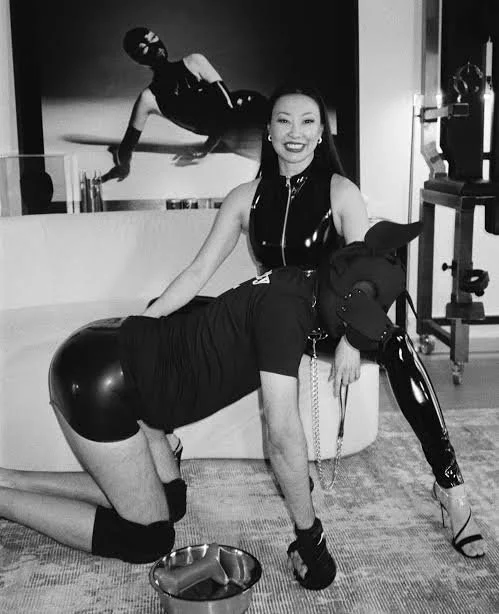I’m Not Your Dominatrix — I’m Your Life Coach with Benefits
I’ve been thinking a lot recently about my style of kink—and why it’s been so hard to find submissive clients I genuinely mesh with.
Ultimately, it seems to boil down to mismatched intentions. Many submissives want to devote themselves to me, calling on a natural dominance I simply don’t possess. What I want, instead, is for them to devote themselves to themselves—to treat the session as a tool for growth and self-understanding.
I’m drawn to people who see BDSM as a kind of higher practice, recognizing its power as a psychological instrument. When play becomes a path toward transformation, it feels sacred. That’s why I show up—not for sexual stimulation, but for psychological stimulation. Understanding the why behind play gives me a raging brain-boner.
Moving forward, I think I’m going to start taking more after Eva Oh, one of the Dominatrices and kink educators who first inspired my journey.




When I found her podcast at the beginning of my path, I was initially put off by her megalomaniac personality (that’s my mommy issues talking). And yet, I also couldn’t tear myself away. There was something magnetic about the way she spoke of taking her clients beyond their small lives.
Here was a classically gorgeous woman charging up to $10,000 a day, using her sexuality as a surgical tool to cut straight to the human condition. She wasn’t just playing—she was teaching. Helping the entitled to see outside of themselves, perhaps for the first time.
A Difficult Lesson Over Lunch
My most recent session brought all of this into sharp focus.
After an impact scene with a new client, he prepared lunch for us. Our conversation drifted toward hot-button Portland topics and eventually landed on homelessness.
This client—an educated, middle-aged white man, as most of them are—couldn’t understand why anyone would “allow themselves” to remain in poverty. Why hadn’t people imagined better things for themselves? Why not just work harder?
I’ve been homeless myself, mostly by choice. It’s grating to explain structural inequity to someone who’s never brushed up against it—but this client had explicitly asked to learn from me. So I tried. I talked about learned helplessness, trauma psychology, capitalism, the failures of government safety nets, and the crushing cycle of debt.
The conversation did not go well. I probably came on too strong—offered too much at once. One of my personal teaching rules is to stick to three main concepts per lesson, whether I’m teaching math or discussing the philosophy of impact play.
He messaged me the next day saying he’d be looking for another provider. I’m fairly certain my overreach cost me the client.
Many of the men I see struggle with unconscious prejudice that limits their personal growth. Perhaps that’s why they come to me—the relationship equivalent of using disposable cutlery to avoid doing the dishes.
I, in turn, wrestle with how much of my own perspective to offer. Like Eva Oh, I’m drawn to the idea of helping them transcend their limitations—but I also know it’s not my place to fix them.
My guiding principle is compassion. It’s served me well, but perhaps it’s not for everyone.
The Rarity of Real Psychological Play
Few people approach me for the kind of work I want to do. It requires a rare kind of psychological masochism—the willingness to sit with discomfort when your ego is exposed.
When someone’s weak points are revealed, their first instinct is to defend themselves—to withdraw or lash out. My role, then, is to help them stay with that discomfort: either by applying consensual force to keep them from retreating or by offering comfort so they can face their anxiety safely.
People need to both desire that discomfort and value my guidance enough to pay for it. That combination doesn’t come around often.
Most clients remain stuck in desire and attraction, rather than using the energy we create as a catalyst for change. They choose self-satisfaction over self-development. And that’s fine—there’s no shame in wanting what you want. But too much of that kind of work eventually burns me out.
The Work of Elevation
I see the elevation of the self as my true job. And like any job, not every task within it is intrinsically motivating.
I’m not a sexual sadist; I don’t enjoy hitting just anyone. I only enjoy it when it benefits someone. I’m not naturally dominant either—I perform dominance for those who need that power dynamic.
What drives me is the craftsmanship of it all: the precision of perfect bruising, the clean geometry of rope, the art of tension and release. These are my tools.
By doing my job with care and knowledge, I give people the erotic energy—the life force—to initiate change.
That’s my purpose.
XO,
Your life coach with benefits.



